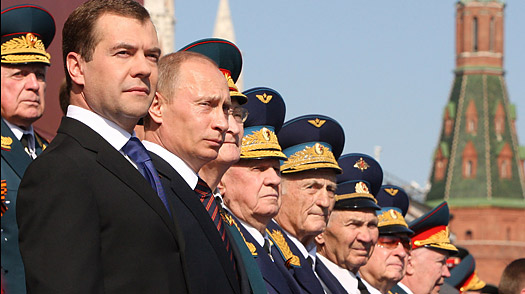Beyond Politicized Rhetoric, Where Does Russia Stand?

President Obama’s recent open-mic gaffe while speaking with Russian President Dmitry Medvedev prompted Republican presidential contender Gov. Mitt Romney to declare:
“It is always Russia, typically with China alongside, and so in terms of a geopolitical foe, a nation that’s on the Security Council, that has the heft of the Security Council, and is of course a massive security power — Russia is the geopolitical foe.”
Critics of Romney, with Medvedev at the forefront, quickly denounced his remarks as outdated and inflammatory. Certainly, Romney took a different tact from then-President George W. Bush’s June 2001 declaration that he had looked Russia’s then-President Vladimir Putin in the eye and “was able to get a sense of his soul.” This was supposed to be a good thing. So, where does Russia stand vis-à-vis the United States?
Twice in the past year, Russia has vetoed resolutions that would have condemned the Syrian crackdown on democracy protesters. As someone who worked at the United Nations, often on Security Council issues, I will tell you that negotiations with the Russians leading up to several resolutions were often difficult and contentious. However, the same could be said of the Chinese, or even the French. The real problem with Russia is that it still has not accepted its role in the post-Soviet world.
Even post-Soviet, Russia still covers 11 time zones as it sprawls across nearly one-sixth of the Earth’s total land mass. The Russian Federation is physically the largest country in the world—stretching 6,000 miles from east to west and is home to more than 100 ethnic groups. Yet, it is one of the few countries in the world with a declining population.
Xenophobia and alcoholism are rampant, divorce rates are extremely high, and the disparity between the rich and the poor is enormous. Keep in mind that up until the dissolution of the Soviet Union, this was a country that never had a truly free citizenry.
However, what it did have through much of its tenure as the U.S.S.R., was status. Despite having little personal freedom, the Russian people had pride in knowing their country was a world superpower. United States presidents from Truman to George H.W. Bush knew their daily national security briefs would always start with updates on the U.S.S.R. In space, sports, military, and foreign affairs, they were our number one geopolitical foe for almost 50 years.
In spite of this , when the U.S.S.R. broke apart, the world saw them for the paper tiger they had become--crumbling infrastructure, warped political system, dysfunctional military, and disillusioned society. Those early days of freedom with Boris Yeltsin at the helm were more like the wild west than any functional transition to democracy--crime was rampant and chaos the norm, as the new nation tried to find its way in the world.
Few Russophiles have been surprised as the people time and again embrace strong-armed Vladimir Putin. Trading freedoms for stability seems to suit the current populace.
So, what’s next for Russia? I once asked this of one of my language instructors while I was in an immersion program in the town of Tver, outside of Moscow. He was a young graduate student, but his answer was so profound that I have yet to find a more thoughtful one. He asked, “Do you know why it took Moses 40 years to lead his people through the wilderness from Egypt to Israel when both lands are so close to each other?” He then answered his own question, “Because Moses wanted all the former slaves and the slave mentality to die off before entering the Promised Land.”




